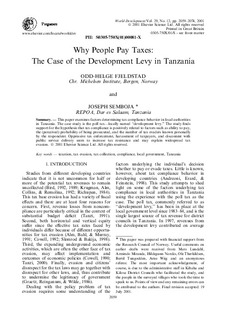| dc.contributor.author | Fjeldstad, Odd-Helge | |
| dc.contributor.author | Semboja, Joseph | |
| dc.date.accessioned | 2018-01-04T08:19:28Z | |
| dc.date.issued | 2001-01-01 | |
| dc.identifier | oai:www.cmi.no:867 | |
| dc.identifier.citation | in World Development vol. 29 no. 12 pp. 2059-2074 | |
| dc.identifier.issn | 0305-750X | |
| dc.identifier.uri | http://hdl.handle.net/11250/2474994 | |
| dc.description.abstract | This paper examines factors determining tax compliance behavior in local authorities in Tanzania. The poll tax - locally named "development levy" - is used as case. The study finds support for the hypotheses that tax compliance is positively related to factors such as ability to pay, the (perceived) probability of being prosecuted and the number of tax evaders known personally by the respondent. Oppressive tax enforcement, harassment of taxpayers and discontent with public service delivery seem to increase tax resistance and may explain the widespread tax evasion observed. | |
| dc.language.iso | eng | |
| dc.relation | World Development | |
| dc.relation | 12 | |
| dc.relation.ispartof | World Development | |
| dc.relation.ispartofseries | World Development vol. 29 no. 12 | |
| dc.relation.ispartofseries | World Development vol. 29 no. 12 | |
| dc.relation.uri | https://www.cmi.no/publications/867-why-people-pay-taxes | |
| dc.subject | Tanzania | |
| dc.title | Why people pay taxes: The case of the development levy in Tanzania | |
| dc.type | Journal article | |
| dc.type | Peer reviewed | |
| dc.identifier.doi | 10.1016/S0305-750X(01)00081-X | |
